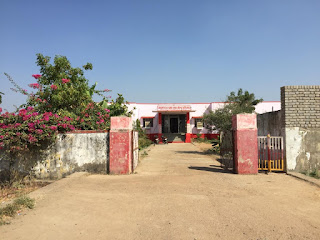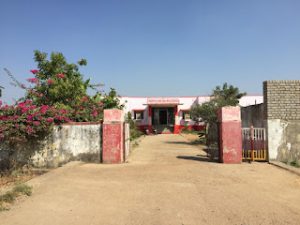

 Harigarh
HarigarhAs women, we are always expected to be careful of our surroundings, of who we talk to, and even how we conduct ourselves. Our path is often blocked by the constant fear of finding ourselves in situations that lead to trouble. Thus, things that come easily to the other half of society often elude our grasp, making it all the more difficult to survive in a man’s world. Being raised in a liberal family that sees no difference between men and women, makes me question the marginalization of women, every day.
I came across a situation during my field visit to a sector called Manoharthana in Jhalawar, Rajasthan. An inebriated man walked into a sub-centre, that was being run by an Auxiliary Nurse Midwife (ANM) and also had a few male patients present. He threatened all those who sat in the clinic and forced them to tend to his self-induced problem. Eventually, the other male patients managed to pacify this nuisance of a man and handled the situation as they felt necessary. It may seem like a fairly inconsequential event to many. However, the anger and dismay I felt at that moment were stronger than others could potentially fathom. I was told that such incidents were routine and all health workers have to deal with them, particularly female health workers.
During another such visit to the Harigarh Primary Health Centre (PHC), I was involved in an interesting conversation with the ANM present there. Apparently, there was a sterilization camp being organized at the PHC a few days later. Many questions popped into my head when I heard of this event which prompted me to ask about her experience while trying to promote vasectomies and other forms of sterilization.
“Aadmiyon se baat nahi karte hum. Kya pata woh humme kya samjhe aur humein kya mushkile hon”
(“We do not talk to men. They might misunderstand us and we might land into trouble with them”)

Photo: Primary Health Centre, Harigarh (Picture: Rithika Sangameshwaran)
Her answer made me wonder what the female front-line workers (FLWs) feel every time they go for health visits around the village advocating for important public health issues like contraception, reproductive health, and maternal health. How comfortable are these women talking about such things in public? Especially when they stand the risk of being stigmatized and labelled uncultured for merely uttering these terms. Perhaps this might be just the smallest of their worries. They might even be subject to physical harassment or worse.
A study conducted in Udaipur, Rajasthan looking at the performance of ASHAs identified multiple socio-cultural challenges [1]. These include lack of support from family members, economic struggles, lack of adequate remuneration, and caste/religion-based discrimination. This study reiterates the importance of societal structures and systems in the functioning of health departments and workers. Particularly with regards to female FLWs including ANMs, Anganwadi Workers (AWW), and Accredited Social Health Activists (ASHAs) who work within a social system that forever burdens women with problems that are essentially not even theirs to start with. It feels no remorse while burying them deeper and deeper, into a dark chasm. Yet, the general consensus is that health workers are lazy, uninterested, and even incompetent. But is that really true?
Even though there might be exceptions to this, I feel we must introspect and ask ourselves how often we pause and think about the consequences of our ignorance. In other words, what are the implications of our ineptitude to alleviate these women from their worries? These women yearn for a world where the combination of their chromosomes does not predetermine their chances at a safe future or their competency. We can only achieve this if we start looking at health in tandem with other wider social and economic determinants and gauge their impact on the functioning of health service delivery.
By writing this article, I do not intend to justify or even excuse the work done by these health workers. I merely wish to find out what role do young individuals like myself play in addressing these inequalities? How do we bring about a social movement where one’s health is prioritized over everything else? How do we build institutions and systems that are strong enough to stand the test of time and eliminate all forms of malady? Perhaps, these are the questions I would be trying to answer during my year-long fellowship with the hope that maybe one day we can build a safe haven for every woman, man, and child.
Notes:
(1) Reetu Sharma, Premila Webster & Sanghita Bhattacharyya (2014) Factors affecting the performance of community health workers in India: a multi-stakeholder perspective, Global Health Action, 7:1, 25352, DOI: 10.3402/gha.v7.25352
Prerna Gopal is a Sr. Program Officer and has previously been a fellow with the Antara Foundation
Disclaimer: The article has been written in personal capacity, and the views and opinions expressed are those of the author